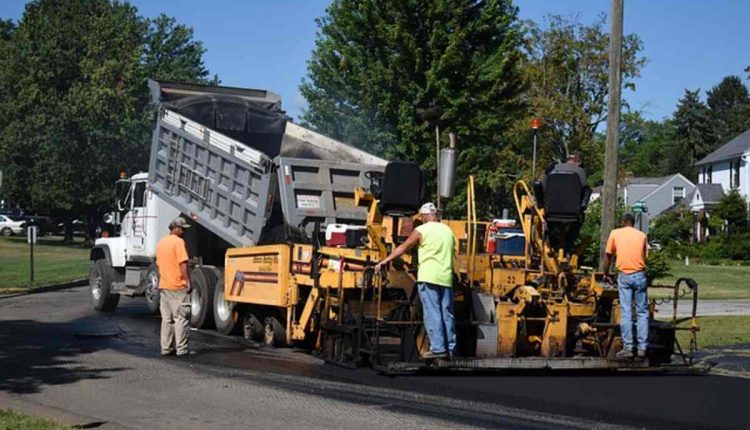Asphalt paving costs can depend on several variables, including mix type and location. Prices also fluctuate based on whether it’s for new construction or an overlay project. The best guide to finding Hometown Asphalt Paving in Newark.
Perpetual pavement is a multi-layer paving technique designed to extend the lifespan of roadways. A strong but flexible base protects against cracks, while an impermanent middle layer serves as a protective buffer zone.
Hot mix
Hot mix asphalt (HMA) is one of the world’s most frequently-used pavement materials, typically produced in a mixing plant before being transported directly to its job site and mixed with aggregates and bitumen in proportions determined by job site needs before being compacted using heavy motor-driven rollers to form an even surface and cost between $8-15 per square foot for its application.
HMA provides numerous advantages over cold-patch asphalt, including its ability to withstand traffic loads and resist environmental conditions that would typically damage its material. HMA’s increased resistance will reduce maintenance costs while increasing the lifespan of pavement surfaces.
HMA costs depend on several variables, including material requirements and labor expenses for site preparation. Risk management costs also factor into HMA prices; contractors must spend money ensuring employee safety on job sites – this expense must be included within the price of HMA projects.
Warm-mix asphalt (WMA), an emerging technology, utilizes less fuel and resources in its production than its HMA predecessors, offering an eco-friendly alternative that is also more cost-effective to transport. While WMA may not last as long, it is suitable for low-traffic areas or patching projects.
Recycled
Asphalt is an eco-friendly material made of petroleum that can be recycled. Often used for driveway paving projects due to its affordability and durability, recycled asphalt may also be mixed with recycled materials to save even more money and protect the environment than newer types like concrete. Costs associated with recycled asphalt vary depending on project specifics, so it is wise to assess all options prior to selecting this option.
Reusing asphalt requires milling old material, which can be accomplished either on-site using an asphalt pulverizer or at an asphalt plant. This process grinds it down into smaller chunks before screening to remove any unwanted debris and then combines it with a binder to form usable paving asphalt.
As an environmentally friendly alternative to mining, this process is environmentally friendly. Reclaimed asphalt can be combined with virgin asphalt to form a more robust product while decreasing construction material needs and waste generated in landfills – both benefits that will eventually biodegrade over time.
The Federal Highway Administration facilitated asphalt recycling with its 2002 policy initiative. Asphalt plants today adhere to tighter environmental standards but still emit air pollutants harmful to the environment that can be filtered out and reused in other ways.
Stamped
Asphalt stamping is an affordable way to add curb appeal to existing or newly laid asphalt surfaces, both living and freshly poured. This technique requires heating the asphalt before stamping it with a template for an elegant, eye-catching design that creates crosswalks or specialty street markings or creatively displays company logos.
Asphalt driveways and parking lots can be stamped with different textures and designs, including stone, brick, and cobblestone patterns. Furthermore, stamped borders can help create an upscale appearance as well as define specific plant areas in a visually appealing way.
Stamped asphalt can be colored in various hues, from white and gray through gray, green, and bright earth tones, created by adding pigment to the hot mix. Once complete, this product can withstand heavy traffic loads, washing cycles, and weather, as well as resist cracking and shifting substrates without breaking or shifting over time.
Stamped asphalt pavements offer an eco-friendly alternative to brick and concrete pavements. They are constructed using recycled materials and emit up to 80% less carbon dioxide during their creation, according to the ENERGY STAR program for asphalt pavements. Furthermore, stamping asphalt is easy to install and maintain; repairs can often be accomplished more easily than concrete repairs.
Cold mix
Asphalt prices depend on the service type and surface area being covered, such as porous asphalt, which costs $8 to $15 per square foot to minimize runoff by allowing water to soak into the ground instead of flowing off quickly from its surface. Additional services, such as excavation or grading, might increase costs further; furthermore, prices could go up if your property is situated away from an asphalt production facility.
Asphalt paving materials are trendy due to being affordable and durable. Ideal for high-traffic areas like roads and parking lots, asphalt can withstand both heavy loads as well as extreme weather conditions; additionally, its heat-absorbing qualities help make driving safer than ever.
Cold mix asphalt provides a temporary fix for small potholes and cracks. Constructed using quarter-inch chip asphalt mixed with oil to keep its consistency flexible for patching in all weather, cold mix asphalt is easily patchable year-round for hassle-free patching in any season – however, due to its reduced strength compared to hot mix asphalt, it should only be used on more minor repairs.
Risk management and safety services can affect asphalt costs as contractors pay for them to protect themselves against liability claims. While they might not directly increase the prices of projects, these services remain an essential element in total project costs.


